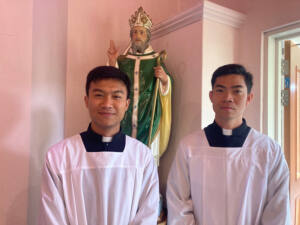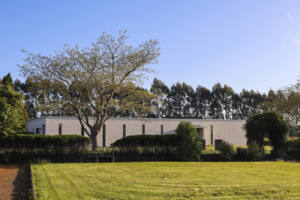The 61st World Day of Prayer for Vocations, also known as Good Shepherd Sunday, falls this year on Sunday, 21 April.
It is a day dedicated to recognising the role of Jesus as the Good Shepherd, and to praying for more people to answer the call to religious and priestly vocations. On this day we celebrate and honor those who have dedicated their lives to serving God and others as priests, nuns, and other religious leaders.
The theme for this year is “Called to sow seeds of hope and to build peace.”
Prayers for Good Shepherd Sunday
Thank you, Jesus, for being our Good Shepherd. Thank you for giving us abundant life, even as we walk through death-shadowed valleys. Thank you for knowing us by name, even though we sometimes forget yours. Claim us and guide us every day, in spite of ourselves, until we are safely in your house forever.
Lord, in your mercy, please hear our prayer.
You are the Good Shepherd. Defend the Church from peril, provide for its needs, and lead it in paths of righteousness. Through its ministry, lead many to hear your voice and follow you.
Lord, in your mercy, please hear our prayer.
You call your sheep by name. Bless the work of theologians and seminary professors. Help them to identify and train faithful “holy sheepdogs,” called by you to help tend your beloved flock.
Lord, in your mercy, please hear our prayer.
Lead our children, especially teenagers, in paths of righteousness and holiness. Defend them from every enemy that tempts them to stray from your side. Channel their energy, idealism and curiosity into ventures that glorify you and lift up others.
Lord, in your mercy, please hear our prayer.
You are the Gate of your sheep. Protect the people of every nation from false shepherds; from rulers who care nothing for their welfare; and from all the threatening dangers of this world. Bring peace in places of violence; rich pasture in places of poverty; and true righteousness in places of injustice.
Lord, in your mercy, please hear our prayer.
For young men and women; That you may give them the gift of understanding to discern their service in the Church, the priesthood, diaconate, or consecrated life; And for the gift of courage to follow your call.
Lord, in your mercy, please hear our prayer.
Find more prayers for vocations at the following links:
Reflections from WelCom
The following reflections appeared in the April issue of WelCom, the newspaper for the Catholic Archdiocese of Wellington and the Diocese of Palmerston North.
Feeling at home in the Diocese of Palmerston North
Peter Hung Nguyen and John Lam Nguyen from Vietnam are living in Palmerston North while they study English in preparation for entering the seminary next year.
Hung Nguyen
I am Peter Hung Nguyen, and I come from the Diocese of Vinh in Nghe An province, Vietnam. There are many splendid and magnificent churches, as well as a large Catholic community in Vinh diocese. I am the youngest of three. I am truly grateful to have been born into a family filled with love from my parents and siblings. Additionally, we have wonderful neighbours in my village who are always ready to help others. I am even more fortunate to live in a parish with gentle and kind people. This is a driving force that motivates me to want to serve.
My vocation journey started quite late. After finishing university, I went to live with a parish priest in a poor parish in Vinh Diocese. At first, I felt quite lonely because everything was unfamiliar, and I didn’t really like it. However, the parish priest taught me how to pray, helping different things in the parish, and reaching out to the poor. Through many interactions and conversations with poor people, I developed a deep appreciation for them, which gradually motivated me to do something to help them and others. Moreover, I had the opportunity to be closer to God’s Eucharist every day while living in the parish.
During that time, I often asked myself, ‘Do I want to become a disciple of God? Do I have the courage to follow that path?’ I found the answer, and now I am living in the beautiful country of New Zealand. I believe it was not my choice but God who led me to this country according to His purpose, where everything is different, from culture to language and people. Initially, I felt very strange, but now I feel very familiar because the people here are wonderful. They give me words of encouragement and I know that I cannot be here without the prayers of many people.
Many times, I knelt before the Lord’s Eucharist and asked myself, ‘Do I love God enough to follow Him?’ I truly desire to become a priest for God and for people. For young people, please remember that do not be afraid to response to God’s call to be priest, it is not an easy journey but the grace of God will help you to overcome all the difficulties you face on your journey.
Lam Nguyen
My name is John Lam Nguyen. I was born in Hoi Yen Parish, Vinh Diocese, in North Vietnam. I was raised in a big Catholic family with seven children. I am the second child and have two brothers and four sisters. My parents work in agriculture.
During my time in college, I joined the monastic vocations group of my home diocese. Here, my vocation seemed to take a new direction, as I learned and practiced virtues under the guidance of the father in charge. From then on, my love for Christ grew stronger and urged me to follow Him. Faced with distinctions about things such as love between men and women, love between husband and wife, material wealth or fame, and position compared to the love of Christ and the love of service, those things cannot be compared.
Through my prayer life, I firmly believe God will give all the necessary grace to those He chooses. As St Paul affirmed: ‘I consider everything a loss compared with the wonderful gain of knowing Christ my Lord. For His sake, I have lost all things and count them as rubbish, that I may gain Christ’ (Philippians 3:8). That is also my choice, for the love of God and the salvation of souls.
About two years ago, I received a call from Fr Trung Nguyen, a Vietnamese priest belonging to the Diocese of Palmerston North. He asked me, ‘Do you want to become a priest in New Zealand?’ Personally, I truly wished to become disciple of Jesus, but New Zealand was never on my mind because I didn’t have any foreign language skills, especially English. When I received that call, I took the time to think and asked my relatives for their opinions, and they advised me to follow my heart’s will. That decision brought me to New Zealand.
Right now, I am just learning English for the IELTS exam. The biggest challenge for me now is the language barrier. The next step in my vocation is to pass the exam and enter the seminary next year.
Youth is the time to stand at a crossroads and choose a direction. It’s a time for making decisions. Both choices are difficult and involve asking many questions. As a young Catholic, vocation is not just about a career, future, or status. Amidst these appearances, God’s invitation may confuse young people’s thinking. May we, as young people, dare to generously listen, discern, and live out the calling that Jesus has for us.
Monastic life with the Cistercians
Jonathan Craven
Southern Star Abbey is a Cistercian monastery located in Kopua, between Takapau and Norsewood, Central Hawke’s Bay, within the Diocese of Palmerston North. The monastery supports itself by operating a dairy farm.
In the year 1098, the first Cistercian monks broke away from the existing Order of St Benedict to get closer to God. For them, this meant having no parishes or schools, which were often run by monks. These were becoming enough of a distraction where the monks would, out of kindness, and their own shortcomings, become more involved in other people’s journeys than their own.
The brothers had a sense that this wasn’t what God wanted for them, and that they would improve the quality of their spiritual life and ministry without them. They reduced the liturgy and time they were spending in church, creating more time for God in their work, private prayer, lectio divina, and study. They had the saying amor ipse notitia est, and amor ipse intellectus est – love is knowledge, love is understanding. By living in this way, the monastery became a magnet of love, attracting many talented men and women.
Part of the attraction was they had reduced their physical comforts and simplified their architecture giving them a greater solidarity with the poor and ongoing lessons in humility. By making these sacrifices for the wellbeing of the poor, the monks were a greater witness to their plight, and their life of voluntary poverty emphasised that the kingdom of God is within us.
Many men and women have thrived spiritually in these conditions of adversity and hardship, becoming more compassionate for the world, reaching a much greater understanding of God and themselves. They have influenced the world for the better through their prayer life, hospitality and witness to the Gospel.
In 1954 six monks came from Mount Mellerey Abbey, in County Waterford, Ireland, to Kopua, to help make it possible for New Zealanders to have the advantage and privilege of being able to live the Cistercian Way of life and serve the Church in this way. They faced the hardships and challenges of founding a new monastery. People from all over the country joined up and things slowly developed to what they are today. Kopua monastery aims to be a place of equality, atonement, inner freedom and humility and is often referred to as a school of love.
I was humbled to spend four years as a junior monk in the monastery. The Cistercian Order is dealing with many challenges these days and vocations are one of them. Of the vocations who enter monasteries, most of them leave about the same time I did, with a few staying on for longer. I was hopeful I could navigate the current difficulties, but the Lord had other plans for me. I’m very grateful for this time and the many things I learned.
Kopua currently has two monks in formation; a novice whose in Australia for a year and a postulant who arrived on Christmas Day, making ten monks in total.
Resources from the National Liturgy Office
The National Litrugy Office has also created some resources for this special day – find there here.


